Capacity Building & Training – Empowering Communities for Sustainable Forest Stewardship
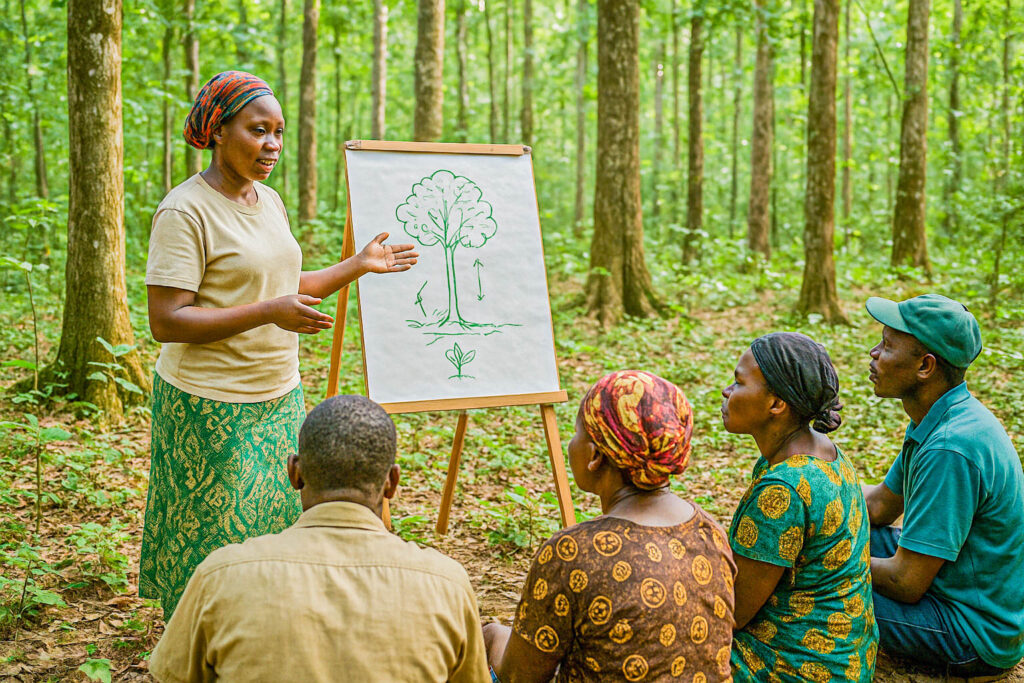
Capacity building forms the foundation of all our conservation and development work, recognizing that lasting change comes from within communities rather than from external interventions. Our comprehensive training programs build the knowledge, skills, and institutions necessary for communities to become effective stewards of their forest resources while achieving their development aspirations.
Effective forest conservation and sustainable development require more than good intentions—they demand technical expertise, strong governance systems, and the ability to adapt to changing conditions. Our capacity building approach recognizes that communities possess valuable traditional knowledge while also needing access to modern tools and techniques to address contemporary challenges.
Community Stewardship Programs
Building Comprehensive Forest Management Capacity Our community stewardship programs develop holistic capacity for forest management, combining traditional knowledge with modern conservation science to create effective, locally-owned forest management systems.
Leadership Development and Governance Training Strong leadership and governance are essential for effective forest stewardship:
- Community Leadership Training: We train community leaders in participatory decision-making, conflict resolution, and transparent governance practices that ensure broad community participation in forest management decisions.
- Forest Management Committee Development: We support communities to establish and strengthen forest management committees with clear roles, responsibilities, and accountability mechanisms.
- Traditional Authority Integration: We work to strengthen traditional governance systems while ensuring they can effectively interface with modern legal and institutional frameworks.
- Women’s Leadership Programs: We specifically support women’s participation in forest governance, recognizing their crucial role in resource management and community decision-making.
Technical Forest Management Skills Community forest managers need diverse technical skills:
- Forest Ecology Training: We provide training in forest ecosystem functions, species identification, and ecological relationships that form the foundation for informed management decisions.
- Sustainable Harvesting Techniques: Communities learn species-specific harvesting methods that maintain forest health while providing needed resources and income.
- Forest Restoration Methods: We train communities in forest restoration techniques including site preparation, species selection, planting methods, and maintenance practices.
- Fire Management Systems: Communities develop capacity for prescribed burning, firebreak construction, and rapid response to forest fires.
Financial Management and Enterprise Development Forest stewardship requires financial sustainability:
- Basic Financial Management: We train community organizations in budgeting, record-keeping, and financial reporting to ensure transparent and effective use of resources.
- Enterprise Planning: Communities learn to develop business plans for forest-based enterprises, including market analysis, cost-benefit analysis, and risk assessment.
- Savings and Credit Systems: We support establishment of community savings and credit groups that provide capital for forest management and enterprise development.
Monitoring and Adaptive Management Effective stewardship requires ongoing monitoring and adaptation:
- Community Monitoring Systems: We train communities to establish and operate monitoring systems that track forest health, harvesting impacts, and management effectiveness.
- Data Collection and Analysis: Communities learn simple data collection and analysis techniques that inform management decisions and demonstrate results to external stakeholders.
- Adaptive Management Principles: We train communities in adaptive management approaches that allow for continuous learning and improvement of management practices.
Technical Training Delivery
Specialized Skills Development Our technical training programs provide communities with specialized skills necessary for modern forest management and conservation, delivered through hands-on, practical approaches that ensure knowledge retention and application.
Geographic Information Systems (GIS) and Mapping Modern forest management requires spatial analysis capabilities:
- GPS Technology: We train community members to use GPS units for boundary demarcation, resource mapping, and activity tracking.
- Participatory Mapping: Communities learn participatory mapping techniques that combine traditional spatial knowledge with modern mapping tools.
- Basic GIS Analysis: Selected community members receive training in computer-based GIS analysis for land use planning and resource management.
- Drone Technology: Where appropriate, we provide training in drone operation for forest monitoring and mapping activities.
Forest Inventory and Assessment Accurate forest inventory is fundamental to sustainable management:
- Sampling Design: Communities learn to establish permanent sample plots and conduct systematic forest inventories using standardized protocols.
- Tree Measurement: We train community members in tree measurement techniques including diameter, height, and volume calculations.
- Species Identification: Communities develop expertise in identifying local tree and plant species, including their ecological roles and economic potential.
- Growth Monitoring: We establish systems for tracking tree growth and forest changes over time to inform management decisions.
Nursery Management and Tree Planting Community nurseries provide seedlings for restoration and agroforestry:
- Nursery Establishment: We train communities to establish and manage tree nurseries, including site selection, infrastructure development, and equipment procurement.
- Seed Collection and Storage: Communities learn proper seed collection timing and techniques, along with storage methods that maintain viability.
- Seedling Production: We provide comprehensive training in seedling production techniques including propagation, transplanting, and quality control.
- Planting and Maintenance: Communities learn proper tree planting techniques and post-planting care to ensure high survival rates.
Sustainable Harvesting and Processing Value-added processing increases income from forest products:
- Post-Harvest Handling: We train communities in proper handling, drying, and storage techniques that maintain product quality and reduce losses.
- Processing Equipment: Communities learn to operate and maintain processing equipment for activities like oil extraction, woodworking, and food processing.
- Quality Control: We establish quality control systems that ensure consistent product standards and build buyer confidence.
- Safety Protocols: All technical training includes comprehensive safety training to prevent accidents and injuries.
Institutional Strengthening
Building Effective Organizations Strong institutions are essential for sustained forest conservation and community development. Our institutional strengthening programs work with community organizations, government agencies, and partner institutions to improve their effectiveness and sustainability.
Community-Based Organization Development We support communities to establish and strengthen their own organizations:
- Organizational Structure Development: We help communities design organizational structures that are appropriate for their size, culture, and objectives while meeting legal requirements.
- Governance System Establishment: We support development of clear governance systems including constitutions, bylaws, and operating procedures that ensure transparency and accountability.
- Leadership Training: We provide ongoing leadership training that builds management skills and ensures smooth leadership transitions.
- Conflict Resolution Systems: We help organizations establish internal conflict resolution mechanisms that address disputes before they become destructive.
Government Agency Capacity Building We work with government forestry agencies to improve their effectiveness:
- Staff Training Programs: We provide training for government forestry staff in community engagement, participatory planning, and collaborative management approaches.
- System Improvement: We support government agencies to improve their systems for forest monitoring, permit processing, and law enforcement.
- Community Collaboration: We facilitate improved relationships between government agencies and forest communities through joint training and collaborative planning exercises.
- Policy Development Support: We provide technical assistance to government agencies developing forest policies and regulations.
Partner Organization Strengthening We support other organizations working in forest conservation:
- Organizational Assessment: We conduct assessments of partner organizations to identify capacity gaps and development priorities.
- Strategic Planning Support: We facilitate strategic planning processes that help organizations clarify their mission, objectives, and strategies.
- Financial Management Training: We provide training in financial management, fundraising, and resource mobilization for sustainability.
- Technical Assistance: We provide ongoing technical assistance in areas of partner organization need.
Knowledge Transfer Systems
Facilitating Learning and Innovation Effective knowledge transfer ensures that lessons learned and innovations developed in one location can benefit communities and organizations elsewhere. Our knowledge transfer systems create platforms for sharing experiences and building collective learning.
Peer-to-Peer Learning Exchanges Communities learn effectively from each other:
- Community Exchanges: We organize visits where communities implementing successful forest management programs host communities beginning similar initiatives.
- Cross-Regional Learning: We facilitate exchanges between communities in different regions to share experiences and learn from different approaches and contexts.
- Farmer-to-Farmer Training: We support experienced community members to serve as trainers for other communities, building local training capacity.
- Women’s Networks: We establish and support networks of women forest managers who share experiences and provide mutual support.
Documentation and Communication We systematically document and share lessons learned:
- Best Practice Documentation: We work with communities to document successful practices and innovations, creating materials that can be shared with other communities.
- Training Material Development: We develop culturally appropriate training materials in local languages that can be used by communities and other organizations.
- Video Documentation: We produce video materials that demonstrate successful practices and can be easily shared and understood by communities with limited literacy.
- Research Publication: We publish research findings and program results in academic and practitioner publications to contribute to global knowledge.
Technology Platforms We use appropriate technology to facilitate knowledge sharing:
- Mobile Communication Networks: We establish WhatsApp groups and similar platforms that allow communities to share experiences and seek advice from peers.
- Online Resource Libraries: We maintain online libraries of training materials, best practices, and research findings that can be accessed by communities and practitioners.
- Radio Programs: We support radio programs that share forest management information and success stories with broader audiences.
Professional Networks We build networks among forest management professionals:
- Practitioner Networks: We convene regular meetings of forest conservation practitioners to share experiences and develop collaborative approaches.
- Research Networks: We facilitate connections between community forest managers and researchers to promote collaborative research and knowledge exchange.
- Policy Networks: We support networks of community representatives who can effectively engage in policy processes and advocate for community forest rights.
Our Process
Systematic Approach to Capacity Building Every capacity building engagement follows our proven five-stage methodology that ensures interventions are appropriate, effective, and sustainable.
Assess: We begin with comprehensive assessments that understand current capacity levels, identify needs and priorities, and recognize existing strengths and knowledge systems. This includes participatory assessments with communities, technical evaluations, and stakeholder analysis.
Design: Based on assessment findings, we collaborate with communities and partners to design customized capacity building programs that address priority needs while building on existing strengths. Design processes are participatory and ensure local ownership of capacity building objectives.
Implement: Implementation emphasizes hands-on learning, practical application, and strong community participation. We use adult learning principles and culturally appropriate teaching methods while maintaining flexibility to adapt to emerging needs and opportunities.
Monitor: We establish monitoring systems that track progress toward capacity building objectives while providing ongoing feedback for program improvement. Monitoring includes both quantitative indicators and qualitative assessments of knowledge, skills, and institutional development.
Evaluate: Systematic evaluation captures lessons learned, measures impact, and identifies successful approaches for replication. Evaluation results inform future capacity building programs and contribute to broader knowledge about effective approaches to community-based forest management.
Measurable Capacity Building Impact
Our comprehensive capacity building programs have achieved significant measurable results:
- Community Leaders Trained: Over 450 community leaders have completed our comprehensive forest stewardship programs across 67 communities.
- Technical Skills Development: Trained 280 community members in specialized technical skills including GIS, forest inventory, and sustainable harvesting.
- Organizations Strengthened: Supported institutional development for 34 community-based organizations and 8 government agencies.
- Knowledge Networks: Established 12 peer learning networks connecting over 200 forest stewards across four countries.
- Training Materials: Developed 45 culturally appropriate training modules in 8 local languages.
Through systematic capacity building, we create the foundation for lasting forest conservation and community development, ensuring that communities have the knowledge, skills, and institutions necessary to be effective stewards of their forest heritage.

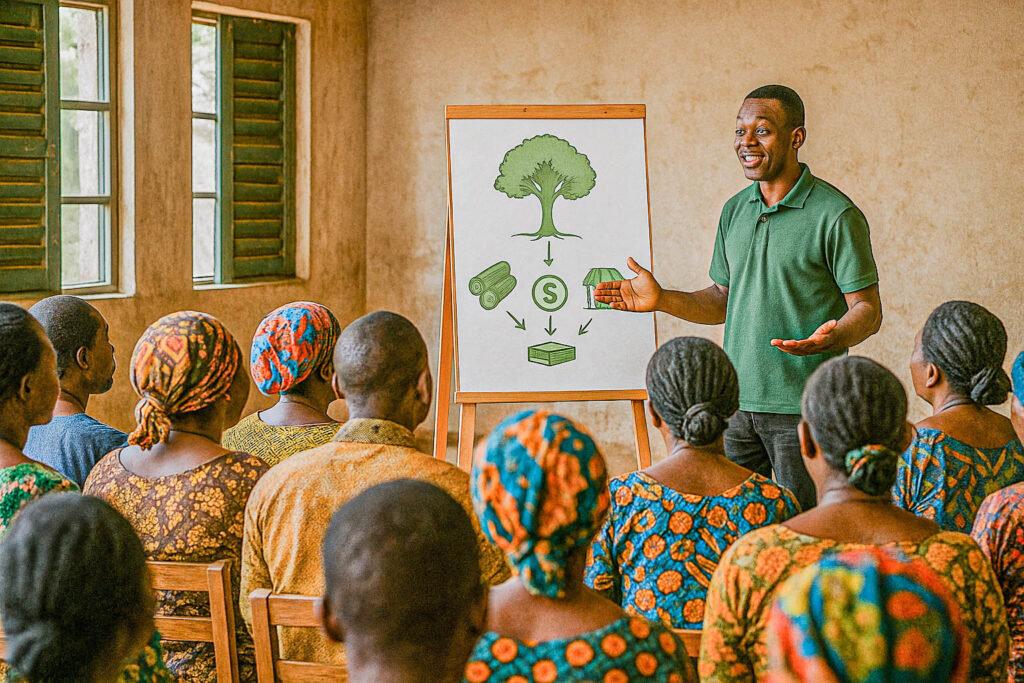
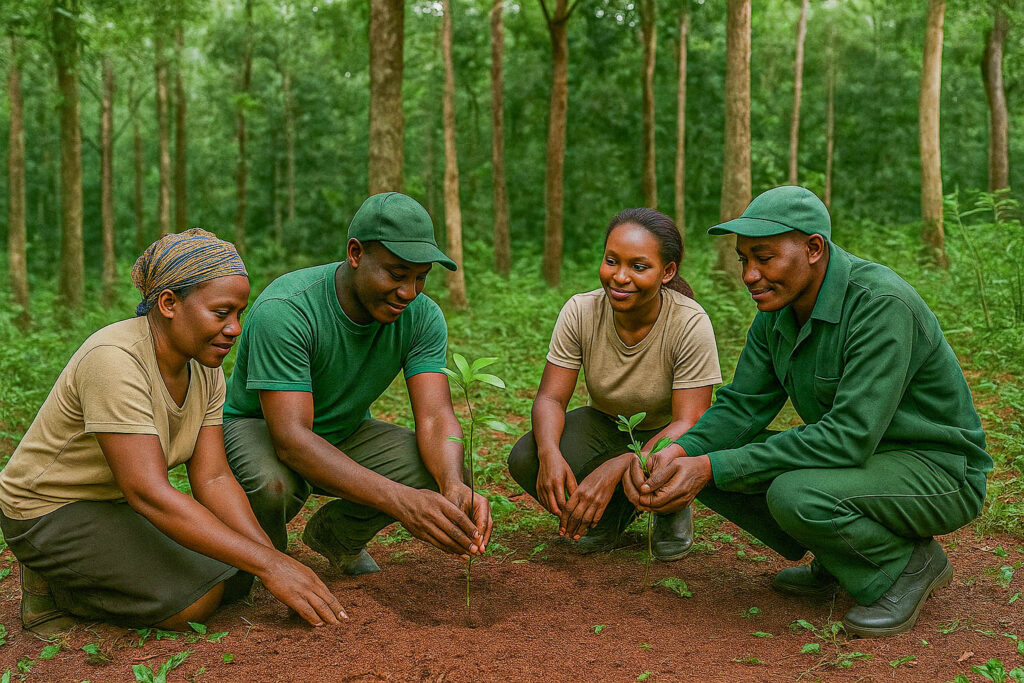
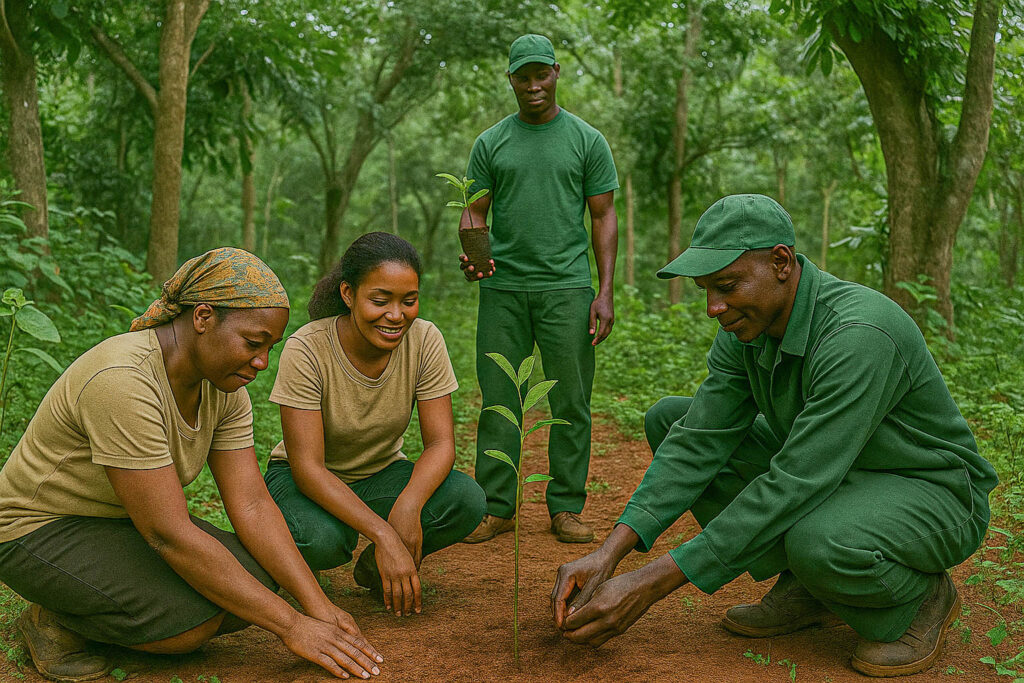

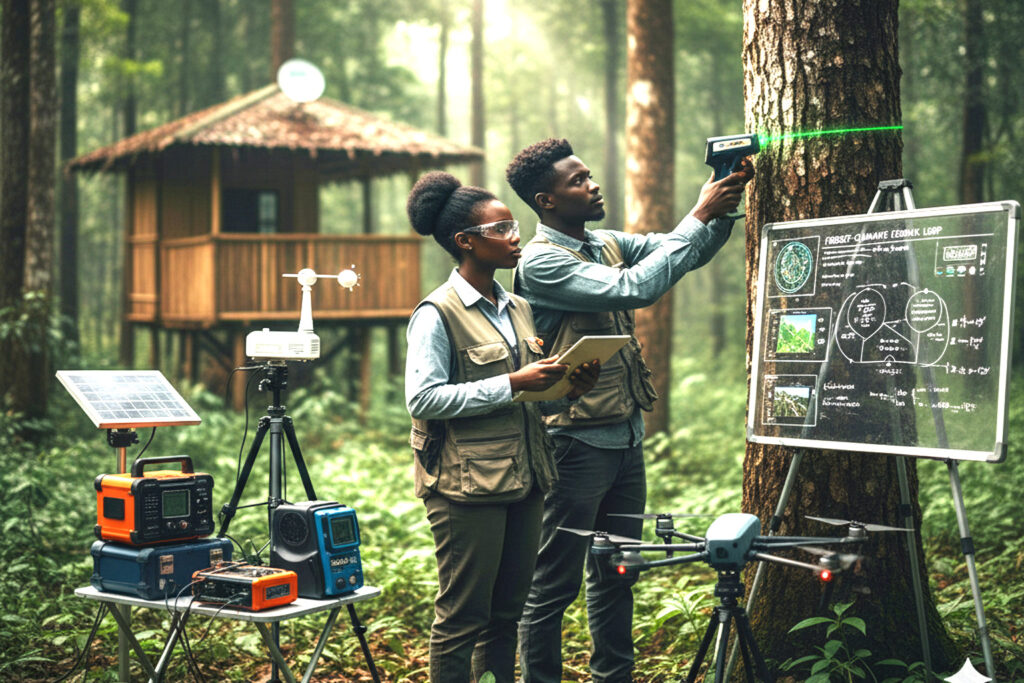
Responses